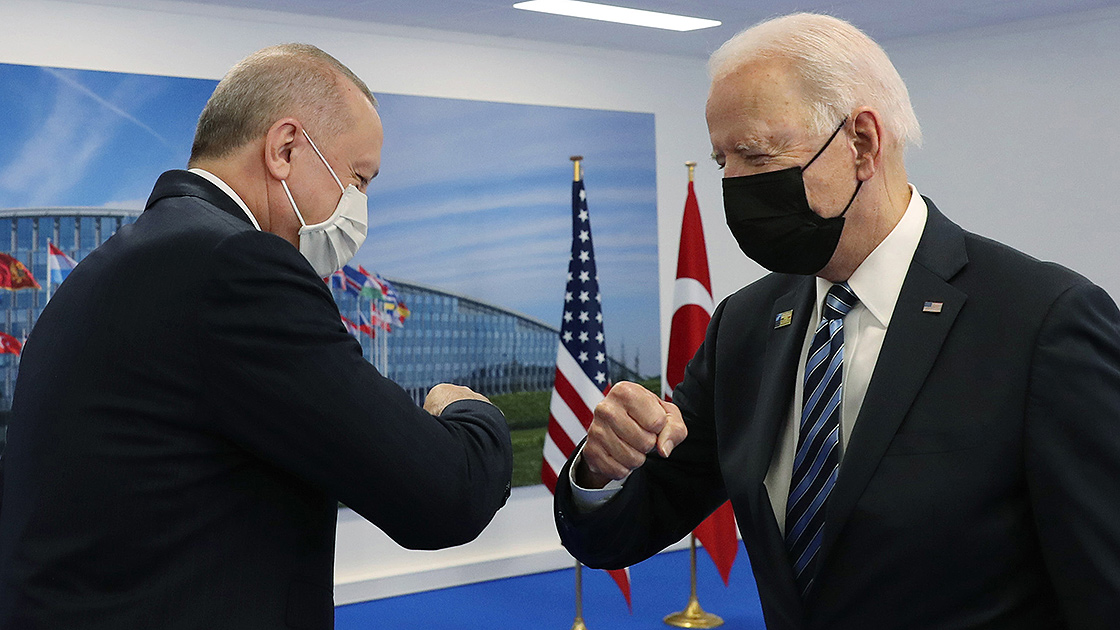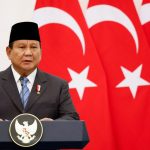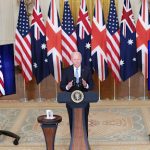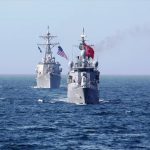The meeting between President Biden and President Erdogan on the sidelines of the NATO Summit is the first face-to-face bilateral meeting on Monday, 14th of June, between the American and Turkish leaders since the US presidential election last year. It was expected that the issues surrounding Syria, Afghanistan, Eastern Mediterranean as well as other regional affairs would be discussed.
In late March this year, Turkey’s Foreign Minister, Mevlut Cavusoglu and the US Secretary of State, Anthony Blinken met on the sidelines of the NATO Foreign Ministers’ meeting in Brussels and signalled possible better ties between the US and Turkey. After the brief talk, Cavusoglu stated that they planned to have more comprehensive talks, despite different opinions on certain issues. Cavusoglu stated that they agreed to hold a broader meeting in either Turkey or the US.
However, US-Turkey ties remain strained, particularly over the issue of Turkey’s acquisition of S-400 missile defence systems from Russia and ensuing US sanctions. Other issues involving the presence in the US of members of the Fetullah Terrorist Organization (FETO), which plotted a coup attempt in Turkey, also American ties with the YPG/PKK, a terrorist organization that the US has worked with to fight against DAESH/ISIS in Northern Syria. Ankara has been demanding the extradition of FETO officials, as well as for the US to cut ties with the YPG/PKK.
Meanwhile, Washington under President Biden has been criticising Ankara over its human rights record, a departure from the Trump administration, which had deemphasized such concerns.
In late April, the two found the NATO powers at odds again when President Biden used the term ‘genocide’ to describe the horrific events of 1915. The White House’s characterization of the event of April 24th, the day of remembrance for Armenians, was denounced by Ankara, underlining that the statement will undermine the friendship between the two countries.
Before leaving for the NATO Summit, President Erdogan said he would raise the issue of the White House’s recognition of the 1915 massacres of Armenians in the then Ottoman Empire as genocide as well as the US removal of Turkey from an F-35 fighter jet programme. However, when asked whether the two discussed American recognition of the genocide after the meeting with President Biden, President Erdogan said, “Thank God, it didn’t come up.” The statement signalled that both parties were willing to leave at least one issue behind at the meeting.
On the first face-to-face bilateral meeting with President Biden on the sidelines of the summit, President Erdogan showed no indication of reversing from the deal with Moscow for the S-400 missile system. The S-400 is an air missile system that US defence officials believe pose a security risk to NATO alliance weapons systems, such as the F – 35, the United States’ most expensive weapon platform.
According to Countering America’s Adversaries Through Sanctions Act (CAATSA), enacted into law in 2017, any foreign government working with the Russian defence sector finds itself in the crosshairs of US economic sanctions. To ease the tension between the NATO allies, some analysts wonder if the Biden administration would lift the sanction. According to the lawyers from Kirkland & Ellis’ International Trade and National Security Practice Group who spoke to CNBC, the unilateral action by the President is unlikely given the complexity of the matter.
Following the meeting, President Erdogan described the conversation to reporters as fruitful and sincere. He also said, “There is no problem with the US that we cannot solve,” while President Biden told the reporters that the meeting was productive and said they could make real progress.
The meeting between the two leaders highlighted the importance of the NATO alliance and seemed clear that both President Erdogan and Biden intend to work towards better relations. The meeting with President Erdogan is also crucial for President Biden as it took place before the meeting on Wednesday with President Putin, where the US and Russian leaders are expected to discuss the issue of the latter’s possible veto of a UN resolution that would allow humanitarian aid to continue into rebel-held sections of Syria via Turkey.
Despite the existing troubles, Turkey remains an invaluable member of the NATO alliance and cooperation between the two countries may be achieved in certain areas. The US withdrawal from Afghanistan in September is likely to result in Turkey maintaining a military presence there. During the meeting, it was reported that President Erdogan suggested that Turkey could secure the Kabul airport along with Pakistan and Hungary. Another possible area of cooperation is in the Black Sea where tensions are high between Russia and Ukraine; Washington and Ankara had a joint maritime drill in February of this year.
Still, despite the positive feedback, there was no breakthrough for the bilateral ties. As many analysts had pointed out, it takes more than one meeting to improve or to have a full reset for the bilateral relations since in which many significant differences exist.
Whether the ties between the US and Turkey will improve under President Biden administration will likely be a crucial topic to be followed and observed. Turkey’s importance for the alliance needs to be recognized by Washington; perhaps the positive vibe as a result of this first face–to–face meeting between the leaders is an encouraging start.









